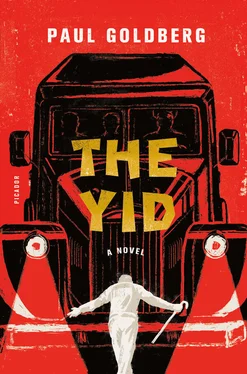KOGAN: And history will get another chance to get it right.
LEWIS: Or fuck it up.
KOGAN: Or fuck it up. As Russian patriots — for this is what we are, make no mistake — we will have done what we can do.
OL’GA FYODOROVNA: Forgive me, but when you negate Shakespeare, are you not also negating the Old Testament notion of retribution and the New Testament notion of salvation?
LEVINSON: Yes and yes.
KOGAN: Uvy, ya tozhe. As do I, alas.
LEVINSON: Killing Stalin is no different from killing the night guard Butusov, which is something you know about, Lewis.
KOGAN: The notion that killing monarchs is somehow more vile than killing night guards is as absurd as the notion that killing a usurper is innately noble. And the definitions of “usurper” and “tyrant” and “impostor” are all in the eye of the beholder. They are rooted in the naïve, anti-scientific belief that legitimate rulers draw their power from God.
LEWIS: Which reservoir of your wisdom are you drawing on, Aleksandr Sergeyevich?
KOGAN: I have one well of wisdom, and it’s a stretch to call it that.
LEWIS: Touché. I will rephrase: Are you speaking as a doctor or as a killer?
KOGAN: The former, of course. The Shakespearean notion that madness and the subsequent onset of suicidal behavior is the price one inevitably pays for regicide is absurd from the clinical standpoint. It’s more simplistic even than Marxism, which similarly has no clinical applications. You can’t treat people based on their relationship to ownership of the means of production. Forgive me this digression. But I can imagine a situation where regicide can have therapeutic value.
* * *
“Speaking of Marx, we need more fuel,” says Levinson, whose face reflects unbridled joy of the sort rarely found on this side of madhouse walls. “I’ll stop somebody and siphon what they have.”
In the uniform of the MGB, behind the wheel of a Black Maria, he is a happy man.
Levinson learned to drive during the war, after the chauffeur of his troupe’s truck died in an air raid, in the same blast that killed two players: a tragedian from Lvov and an operetta singer from Tashkent.
In the middle of the Karacharovo Bridge, an unremarkable railroad overpass, Levinson spots a canvas-covered Willys.
Stopping the Black Maria, he shifts into reverse, gets off the bridge, and turns off the lights.
Next to a snowdrift, he cannot see onto the bridge or be seen from it.
* * *
“I will go,” says Kima, who sits to his right.
“You don’t look like a soldier,” says Kogan from the cage. “Stay in the shadows at least.”
“She looks more like a soldier than komandir looks like a lieutenant,” says Lewis.
Indeed, what options do they have? An elderly lieutenant whose arms are longer than his sleeves? Another soldier who badly hides her age and gender? The False Paul Robeson and his False Wife, who is actually an old Jewish doctor in black face paint and a less than tasteful dress? Can an ensemble be less convincing?
Lewis bites his lip, and Kogan smiles, that harlot. Grave danger makes him smile. In 1918, Kogan could laugh while fouling his pants from fear, adrenaline, and recoil from the Maxim.
Ol’ga Fyodorovna chants a poem or a prayer, and Kima is genuinely calm. This isn’t a façade: she used up her reserve of feelings beneath the sheepskins the previous night. At least for a while, there will be no more.
Levinson hands Kima a thin piece of tubing. She takes it silently, opens the door, and steps out into the snowy darkness. Walking to the back of the Black Maria, she unsnaps the ten-liter canister.
With the tube in her left hand and the canister in her right, she walks to the middle of the bridge and taps on the window of the canvas-topped Willys.
A man in uniform is asleep in the front seat inside.
The vehicle’s engine is running. He is trying to keep warm.
The time is 2:19 a.m.
* * *
Seven years earlier, the MGB had an elite force whose business was to fight all anti-Soviet underground forces, both imaginary and real, but mostly the former.
It used terror to combat terror.
The unit, called the Fourth Directorate, was dissolved and renamed in 1946, then the remnants were reorganized out of existence in 1949 and the remnants of the remnants were reassigned to tasks that included security of transportation.
In its sadness, the fate of Klim Grigoryevich Bykov, formerly a major of state security, paralleled the fate of the Fourth Directorate that had employed him.
After getting through the war as a member of the fearsome organization called SMERSH, an astonishing acronym for smert’ shpionam , death to the spies, he transferred to the Fourth Directorate, only to be busted down to private. At forty-six, he is likely the oldest private in the MVD.
He doesn’t know exactly why he is sitting in a cursed Lend-Lease Willys in the middle of Karacharovo Bridge. It has something to do with the lists, the Jews and their treason, and people’s anger, and just retribution, and all kinds of things that he has duly noted, but doesn’t take to heart.
Why is he here? Does anyone care enough to stop this operation, this deportation of people who matter no more than, say, Crimean Tatars or Volga Germans or Chechens, by blowing up a bridge?
As an insider, Bykov understands that there is no such thing as an internal threat. It is fiction. Useful? Yes. But fiction still. He doesn’t really believe that people whose lives he cut short were really wreckers, or spies, or terrorists.
The rumbling of freight trains beneath the bridge produces somnolence, which can be deepened by swigs of Kubanskaya. In SMERSH and the Fourth Directorate you learn to accept that sometimes cadres get overly zealous, that mistakes are made, but you never expect that you will become the target of someone’s overreach, even though you know people who have.
He is a good man, and as such, he doesn’t deserve to spend his nights in stopped, cold cars atop cold bridges.
Investigators are thorough by nature, and Bykov is capable of producing an account of the string of intrigues and misunderstandings that led him back to the rank of private and the task of sitting atop the Karacharovo Bridge in the middle of the night.
A tap on the window awakens him.
Groggy, he sees the face of a young woman, a girl, really. The girl is wearing an MVD overcoat.
“Since when did we start drafting girls,” Bykov mutters.
“Ey, bratishka,” says the girl in an absurd deep voice. “Otley benzina chutok. Tak do Lubyanki ne doberemsya.” Hey, brother, let us syphon off a little gasoline. We don’t have enough to get to Lubyanka.
“A chto u vas na baze ne khvatayet?” Are you saying you don’t have enough at your base?
Bykov has seen many a deception, but nothing this overt, nothing this senseless. Why is this girl in uniform? Where did she get it?
“Est’ to est’, bez problem, tol’lko vot daleko zayekhali. Radius, ponimayesh, bol’shoy, a podzapravit’ negde. Tak vot ne dobralis’. V pol-kilometra otsyuda vstali.” No, they have it, no problem, except that we got too far, a big radius, understand? And no place to top off the tank. Stopped a half a kilometer from here.
Why does she have a gasoline can? Is this a prisoner escape?
This much Bykov knows: when you let people talk, they hang themselves, so keep them talking.
He asks a question: “A kogo vezete-to? Kogo arestovyvali?” Whom do you have there? Whom did you go to arrest?
“Nikogo. Doma ne bylo. Naprasno perlis’. Teper’ trekh litrov ne khvatayet.” Nobody. They weren’t at home. Ended up with nothing. Now we are three liters short.
Читать дальше












